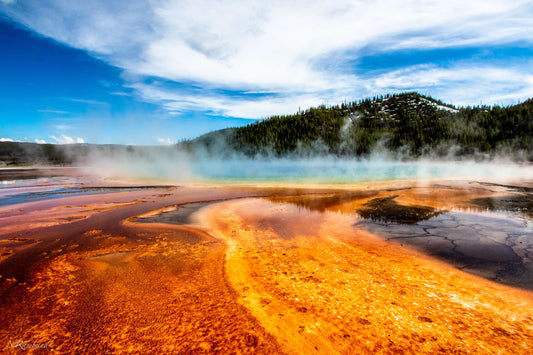If you were forced to guess, what would you say is America's most popular National Park? Yosemite? Yellowstone? It's actually the Great Smoky Mountains National Park, and the 450+ mile Blue Ridge Parkway, which crosses the Appalachians. The Great Smoky Mountains National Park, and surrounding area, are a beautiful place to visit with your eBike - but make sure you understand the rules and regulations, and unique challenges of riding in this Park - before you go.
The Great Smoky Mountains National Park includes diverse flora and fauna, lakes, rivers, and even waterfalls. Despite the name, you won't be riding in smoke. That hazy effect is actually fog.
As with Yosemite, eBikes are generally welcome anywhere cars can go Great Smoky Mountains National Park, subject to a few restrictions. Generally, eBikes are welcome in campgrounds, roads and other paved surfaces; but not on walking paths or dirt trails. Great Smoky Mountains National Park offers some great riding, but also steep terrain, narrow roads, and less-than-perfect pavement, plus sometimes heavy car traffic, which can make riding challenging - so some planning is in order before you visit with your eBike. Here's how to decide:
Can you bring your eBike to Great Smoky Mountains National Park? Where can eBikes ride?
Yes you can, and these changes are relatively new. First, know that the Great Smoky Mountains National Park touches Tennesse and North Carolina. When you're in the park, the rules are Federal, but it's also important to consider the surrounding area. Those states have both adopted the Class I, II, III eBike rule system, so if you have a properly-labeled Class I, II, or III eBike, you're in business. In Tennessee, you can ride on roads and bicycle paths. In North Carolina, the same applies, but you're restricted to roads with a speed limit of 25 MPH and below.
Inside the Great Smoky Mountains National Park, federal rules apply. Responding to the growth of eBikes, in Fall, 2019 it was announced:
eBike riders are allowed on “any park road where motor vehicles are allowed; seasonally closed roads; and the Gatlinburg Trail between the Sugarlands Visitor Center and Gatlinburg (1.9 miles), the Oconaluftee River Trail between the Oconaluftee Visitor Center and the town of Cherokee (1.6 miles), Indian Creek Trail (2.9 miles), and Deep Creek Trail (1.4 miles).”
These rules apply to "low speed" eBikes - Class I and II models that max out at 20 MPH. If you own a Class III eBike, you may be able to adjust the speed limiter to comply with local regulations while traveling to places with different rules.
Great Smoky Mountains National Park also has some unique rules not found elsewhere. If you own a Class II eBike, which can provide assistance via a throttle without pedaling, it's OK to bring it - but you are not to use the throttle unless you're in a location also open to motor vehicle traffic, i.e. open roads, so stick to pedal-assist only on paths closed to cars.
Generally, park trails are closed to bicycles
Most park trails are only open to pedestrians. Exceptions are:
- The Gatlinburg Trail
- Oconaluftee River Trail
- Lower Deep Creek Trail
which are open to bikes (including eBikes). Bicycles of any type are prohibited on all other park trails.
Note: there aren't any "mountain biking" trails accessible by bike, eBike or not, within the park, but the surrounding national forests have many opportunities for mountain biking trails.
Before visiting, make sure you understand where you can, and can't ride. You may wish to bring your eBike, but also plan for some sightseeing by car or on foot to maximize your Great Smoky Mountains trip.
Cades Cove Loop vehicle-free days
One of the can't-miss destinations in Great Smoky Mountains National Park is the closure of the Cades Cove Loop to motor vehicle traffic. In 2022, this happens each Wednesday from Spring to Fall, providing an opportunity to walk or ride this 11 mile loop free of worry about cars.
Cades Cove is a great place to spot wildlife and lends itself to making multiple stops. You can ride your eBike along the loop to a hiking trailhead, take a hiking break, then return to your bike to continue the loop. Don't forget your bike lock.
You can also camp in the Cades Cove area - combining camping and your eBike into a bikepacking or bicycle touring trip. If you didn't travel with your own bike, the Cades Cove Campground has seasonal bicycle rentals available to get your fix.
Other best places to ride
When planning your trip, take a look at Greenbrier and Tremont areas in Tennesse; in North Carolina, Lakeview Drive and Cataloochee Valley are highlights recommended for bicyclists by the National Park Service.
For an overview of the entire park, check this high-resolution (PDF file) map with excellent detail.
eBiking the Blue Ridge Parkway
If you're considering a visit to the Great Smoky Mountains National Park, you likely also have your eye on the adjacent Blue Ridge Parkway.
Riding all or part of the Blue Ridge Parkway is incredibly popular - so much so that the National Park Service has an entire help page just for bicyclists. You should carefully consider whether you're ready first. The road can be narrow, winding, and doesn't have dedicated bike lanes. That said, it's a place of immense beauty, and an eBike can help you keep up with motor vehicle traffic and better handle hills. If you aren't an experienced cyclist, consider an off-season visit or restricting your riding to less busy areas.
Safety
Before riding the roads in Great Smoky Mountains National Park or the Blue Ridge Parkway, consider some tips for safer riding. You'll want to pack lights - perhaps for daytime running for additional safety, but also because the Blue Ridge Parkway passes through multiple tunnels as well.
Be aware of rapidly changing weather conditions, and the distance between developed areas. Pack rain gear, tools and supplies to make basic repairs, and enough food and drink to avoid getting stranded.
Finally, bring your helmet. We recommend all riders on any type of bike wear a helmet at all times, but it's also required by North Carolina law for riders 16 and under, as well as many counties in Virginia.




